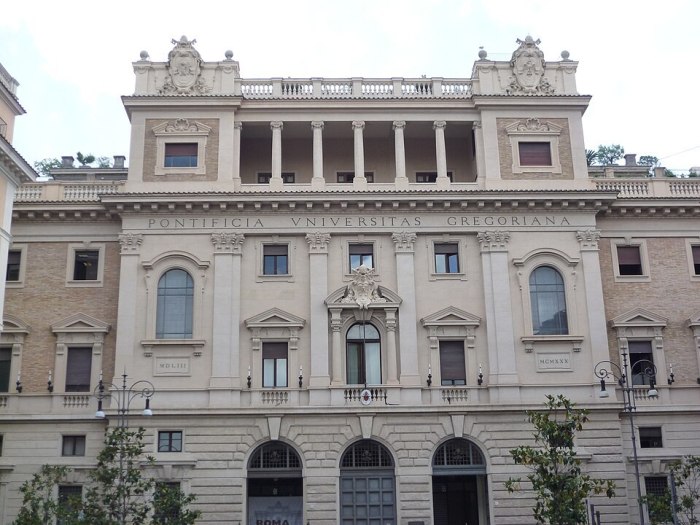
Faith leaders and human rights groups condemned a Vatican university's decision to host an Azerbaijani state-sponsored conference, arguing that the event offered a platform to Azeri historical revisionists attempting to erase Armenian history from disputed territories between both countries.
Orthodox Archbishop Vicken Aykazian, the ecumenical director of the Eastern Diocese of the Armenian Apostolic Church of America, believes money is the reason behind the "Christianity in Azerbaijan: History and Modernity" event.
The conference, which took place on April 10 at the Pontifical Gregorian University, featured speakers from Turkey, Kazakhstan, Uzbekistan, Georgia, Russia, South Korea, Poland, Italy, Germany, France, the United States and Lithuania.
In a statement to The Pillar last week, Aykazian asserted that Azerbaijan's funding of Vatican projects has influenced its approach to the country's ongoing conflict with Armenia. The archbishop claimed that some cardinals and Vatican officials have received funding from Azerbaijan.
"These kind of events are allowed because of money, the Vatican has been receiving money from Azerbaijan for some time — the main example being the restoration of Saint Paul Outside the Walls, which was funded by Azerbaijan," Aykazian said.
In response to an inquiry from The Christian Post, a spokesperson for the Pontifical Gregorian University said that the institution was not involved in organizing the event, nor did it "grant any patronage or any collaboration."
"No academic authority or our lecturer gave any greetings, papers or attended the event," the spokesperson told CP. "Its holding at this venue was due to the mere rental of a lecture hall."
"Instead, a message of greeting from the Prefect of the Dicastery for the Oriental Churches and another from the Prefect of the Dicastery for Interreligious Dialogue were read out during the event."
The Baku International Center for Multiculturalism did not immediately respond to The Christian Post's request for comment.
According to The Pillar, promotional materials for the event included "distinctly Azeri reads on West Asian history," such as a display of the medieval Armenian monastery of Dadivank. The display included the Azeri government's claim that the Armenian monastery belonged to the "Caucasian Albanian" culture.
Earlier this month, the watchdog group Artsakh Monument Watch, an independent academic platform, raised additional concerns about the conference, claiming that the organizers arranged the event in secret.
"The Azerbaijani side kept the information about the conference top secret and made it public 1-2 days before the start of its work," Artsakh Monument Watch wrote in a statement on its website. "The entrance to the conference was also closed."
Several participants at the conference have a history of promoting "Azerbaijani propaganda," according to the watchdog. One of the conference participants that Artsakh Monument Watch highlighted is the Russian clergyman Archpriest Alexy (Andrey V. Nikonorov).
The watchdog claimed that the clergyman has a history of making anti-Armenian statements and giving "Azerbaijani appropriation" the "appearance of scholarship," all while presenting himself as a scientist.
"The Russian clergyman, 'knowledgeable' in history, who also defends the interests of Orthodoxy, seems to consider it normal that the Armenian churches of Shushi are declared Orthodox, and is silent about the Russian churches destroyed during the Soviet years," the watchdog group stated.
"In some of his statements, he also expresses dubious thoughts about the Armenian Apostolic Church (see: Around the Russian Church in Gevorgavan)," Artsakh Monument Watch continued.
Following the conference, the Armenian Legal Center for Justice and Human Rights issued a letter to the Pontifical Gregorian University, calling on the institution to take corrective action by disassociating from the topics presented at the event.
As the Armenian Weekly reported last week, the ALC's letter stated that Azerbaijan's efforts to erase and appropriate Armenian culture constitute a violation of international law, including the 1954 Hague Convention for the Protection of Cultural Property.
"The event, organized with the participation of the Azerbaijani Foreign Ministry, raises urgent legal, ethical and human rights concerns with direct implications under international law," ALC stated in the letter.
"By permitting a state-led conference advancing the discredited theory of 'Caucasian Albanian' continuity — used to appropriate Armenian Christian religious and cultural heritage in Nagorno-Karabakh — the University risks complicity in a broader campaign of denial and cultural genocide," the document continued.